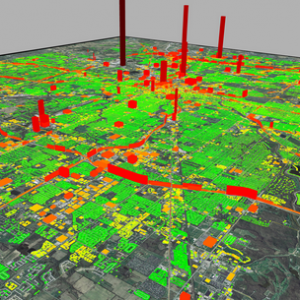January 7, 2015
Sarah Porter named inaugural director of Kyl Center for Water Policy at Morrison Institute
Following a national search, natural resource expert and Audubon leader Sarah Porter has been named the inaugural director of the new Kyl Center for Water Policy at Morrison Institute.
"I am so excited to join the new center and help it succeed in finding collaborative solutions to address our state’s water challenges," said Porter, who had been with the Audubon Arizona since 2006, including as executive director since 2010.
She will begin her new job at Morrison Institute for Public Policy on Jan. 20.
"We couldn’t be more pleased with having Sarah take charge of the Kyl Center as Arizona seeks new and innovative ways and strategies to settle water claims, develop sound water policy through consensus and better educate the general public about water resources and choices," said Thom Reilly, director of Morrison Institute for Public Policy at Arizona State University.
Porter has a broad understanding of both Arizona and regional water issues, having directed Audubon’s Western Rivers project, a multi-state initiative to raise awareness of the challenges to Colorado River sustainability, as well as protecting and restoring flows for critical habitats and communities.
"It’s all about securing Arizona’s water future through collective and inclusive input from a diverse roster of agency leaders, elected officials, policy makers and stakeholders. Sarah understands that," Reilly said, noting Porter’s nonpartisan and collaborative successful initiatives at Audubon.
The Kyl Center, named after retired U.S. Sen. Jon Kyl in recognition of his statesmanship and continued leadership on water issues, was officially launched in November after a $1 million gift from the Morrison family. The Kyl Center is housed at Morrison Institute, which is part of the ASU College of Public Service and Community Solutions.
Kyl, who is actively involved in the center, including the selection process for the director post, said he was pleased by the choice of Porter.
"I was very impressed by the quality of all the candidates who expressed interest in the position, and particularly impressed by Sarah’s credentials, energy and dedication to collaboration – all of which are needed in making the center the success we all want and need it to be," Kyl said.
Morrison Institute last month announced the addition of two senior research fellows to help with the research component of the Kyl Center for Water Policy: Kathleen Ferris, executive director of the Arizona Municipal Water Users Association; and Rhett B. Larson, an associate professor of law in the Sandra Day O’Connor College of Law at ASU. Both are attorneys.
Porter also is an attorney, having graduated from Harvard University with a bachelor’s degree and obtaining her juris doctor from Arizona State University (ranking third in her class). She clerked for federal appellate Judge William Canby and was a litigator for Brown & Bain; Coppersmith Gordon Schermer Owens & Nelson, PLC; and Osborn Maledon PA.
She said she left her law career in 2006 for Audubon because she wanted to contribute to a collaborative effort to address Arizona’s natural resource challenges. She will now dedicate that focus to the Kyl Center.
 Two Arizona State University engineers – Mariana Bertoni and Stuart Bowden – will aid photovoltaic manufacturing and supply-chain companies in advancing their technologies as part of a U.S. Department of Energy initiative. Both are faculty members in the School of Electrical, Computer and Energy Engineering, as well as senior sustainability scientists at the ASU Wrigley Institute.
Two Arizona State University engineers – Mariana Bertoni and Stuart Bowden – will aid photovoltaic manufacturing and supply-chain companies in advancing their technologies as part of a U.S. Department of Energy initiative. Both are faculty members in the School of Electrical, Computer and Energy Engineering, as well as senior sustainability scientists at the ASU Wrigley Institute.













